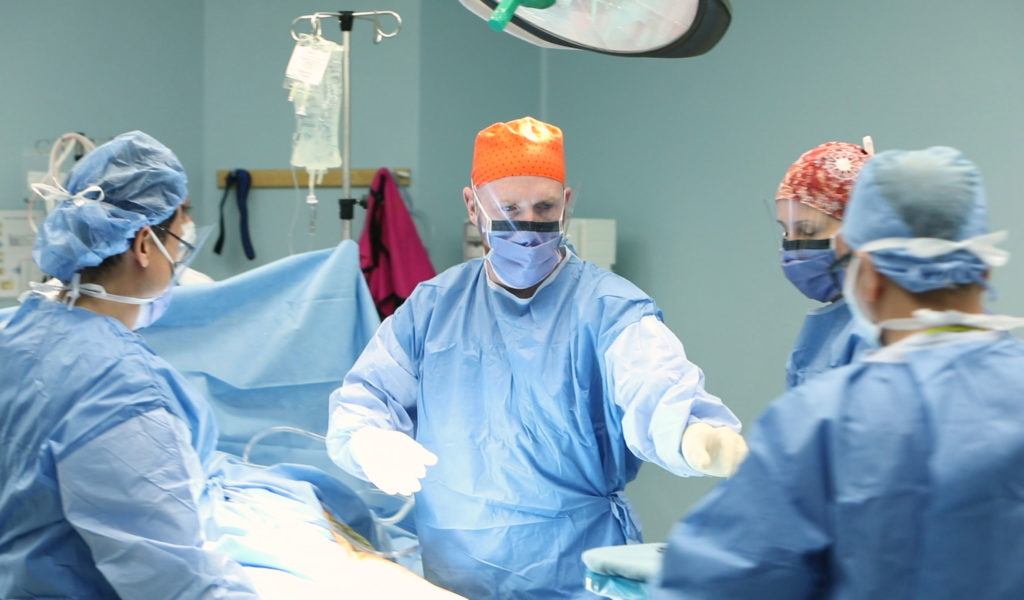Story

Surgery
Welcome to Surgery
Our Surgery team has various highly qualified healthcare professionals that support a wide range of surgical procedures across 11 surgical specialties.
Our specialized surgical care in the areas of cardiac, dental and oral, ear, nose and throat, general, obstetrics and gynaecology, ophthalmology, plastics, thoracic, urology and vascular is firmly tied back to our goal of delivering clinical excellence in surgical services.
-
News & Media
-
Preparation & Referrals
-
After Care
-
Surgical Offerings
-
Physician Directory
-
Programs & Clinics

Media
Hip Resurfacing at Southlake
By The
Numbers
33,000+
Same-day surgery program procedures per year
Preparing for Care
Donate
Parking at Southlake
Frequently Asked Questions
Referral Forms

Media
Giving Patients Their Voice Back
Our goal is to make your surgical experience as comfortable and stress-free as possible for you and your family.
Patient Surgical Package
Please click here for the patient surgical package. This includes instructions and information for pre-admission, medication, anesthesia and pre and post-operative care tips.
Admission
The day has come for your scheduled surgery. Please check in at the Welcome Centre on level 1 of the East Building upon arrival. To avoid delays please read our Admissions page.
After checking in, you will be directed to level 2 of the East Building to the Surgical Admissions Department. Here you will be greeted by a member of your new health team.
Pre-Operative Clinic
For information on the Pre-Operative Clinic, visit Surgery’s Programs & Clinics tab.
Initial Assessment
A Southlake health team representative will provide you with information about your surgery along with a chance to discuss any post-operative needs. Your assessment will include:
- Your medical history, including past surgeries
- All medications you are currently taking, including the dosage and frequency
- History of allergies
- Any special needs, e.g. hearing aids
- Special surgical education classes will depend on your procedure
Anaesthetic Assessment
If recommended by your physician, an anaesthesiologist will meet with you for an assessment. As each assessment focuses on individual needs, you may be required to spend 2-4 hours in the Pre-Operative Clinic during this assessment.
Blood Conservation
Southlake’s Peri-Operative Blood Conservation Program is part of the Ontario Nurse Transfusion Coordinators Program, funded by the Ontario Ministry of Health — more commonly known as the ONTrac Program. This program is to improve blood transfusion practices by promoting alternatives to blood transfusions. These alternatives concentrate on improving patient care and well-being in a cost-effective manner. Southlake is one of 25 centres throughout Ontario with a Blood Conservation Coordinator. For more information on this program, please visit the ONTrac website.
Southlake’s surgery team will work with you and your family to prepare for your upcoming surgical procedure. In some cases, you will need diagnostic testing. Your surgeon will determine what tests are needed with the accompanying requisition forms during your initial visit to the hospital. Some or all of the following tests may need to be performed:
- Blood work
- Electrocardiogram (ECG)
- Chest x-ray
For further information on testing preparation, please visit our Imaging, Pharmacy and Laboratory pages.
Recovery
Your surgery recovery begins in the Post-Anesthetic Care Unit (PACU), or more commonly known, the recovery room. Specialized registered nurses will make sure that your recovery is as safe and comfortable as you would expect from Southlake.
Day Surgery Care
For surgical operations that require shorter recovery periods, patients are transferred to the Surgical Day Care area before discharge. Here patients are encouraged to be with their families while their discharge information is shared. Follow-up appointment information will also help assist patients once they arrive home with medications or special information.
Inpatient Surgery Unit
For information on the Inpatient Surgery Unit, visit Surgery’s Services & Clinics section.
Musculoskeletal Unit
For information on the Musculoskeletal Unit, visit Surgery’s Services & Clinics section.
Post-Operative Care
Your post-operative care planning may include:
- Pain control
- Mobility
- Incision care
- Dietary
- Care after surgery
We also provide personal instruction and patient educational materials.
Discharge Planning
Discharge planning begins when your surgery is scheduled. Your healthcare team will work with you and your family to determine when you are ready to go home. As part of your healthcare team, a discharge planner may work with you to ensure your safe discharge from hospital.
Follow-up support for breast surgery or ostomy patients is provided by a specialized professional at the hospital.
The Surgery program is comprised of various highly qualified healthcare professionals that support a wide range of surgical procedures.
Our specialized surgical care is firmly tied back to our goal of delivering clinical excellence in surgical services.
Our Surgery Program is comprised of 11 surgical specialties. Surgical Services include:
General Surgery
General surgery is comprised of multi-disciplined surgeons with expertise in acute care surgery, trauma and oncology.
Cardiac Surgery
Our cardiac surgeons offer all forms of cardiac surgical care, including complex heart surgery, mitral valve reconstruction, aortic surgery and some adult congenital repair.
Vascular Surgery
Southlake’s vascular surgeons have significant expertise in the management of arterial disease.
Orthopaedic Surgery
Southlake is one of the most progressive hospitals for musculoskeletal surgical care.
Plastic Surgery
Our plastic surgeons carry specialties involving the restoration, reconstruction or alteration of the human body.
Urology
The specialty of urology is dedicated to the study, diagnosis and management of diseases of the urinary tract and the male reproductive system.
Thoracic Surgery
This surgical specialty attends to the diseases of the chest (thorax), as well as the trachea, esophagus, and stomach.
Ophthalmology Surgery
Ophthalmologic surgery, or eye surgery, is performed on the eye and/or its individual parts.
Obstetrics and Gynecology Surgery
Obstetric and gynecologic surgery relates to the procedures that are performed to treat a variety of conditions affecting the female reproductive organs.
Ear, Nose and Throat Surgery
Ear, nose and throat surgery is the surgical treatment of diseases or injuries of the ears, nose, throat, head and neck areas.
Dental and Oral Surgery
These medical procedures involve surgery of the teeth, gums and jawbones.
Filter by Name
Filter by Department
Filter by Language
Dr. Sena Aflaki
Anesthesiologist
English
Dr. William Andrade
Plastic Surgeon
Plastic Surgeon
(905) 898-2519
English
Dr. Jenna Theriault
Otolaryngologist (Ear, Nose & Throat)
Otolaryngeal Surgeon
English
Dr. Olubimpe Ayeni
Plastic Surgeon
Plastic Surgeon
(905) 853-6644
English
Dr. Oluwole Ayeni
Plastic Surgeon
Plastic Surgeon
(905) 853-6644
English
Dr. Graham Belovay
Ophthalmologist (Vision and Eyes)
Ophthalmological Surgeon
(416) 663-3937
English
Dr. Thomas Bertoia
Orthopaedic Surgeon
Orthopaedic Surgeon
(905) 895-1361
English
Dr. Lukasz Boba
Vascular Surgeon
Vascular Surgeon
289-903-1000
English
Dr. Amir Bouzari
Anesthesiologists
Anesthesiologist
(905) 895-4521
English
Dr. Genevieve Chang
General Surgeon
Obstetrics and Gynaecology/Surgery
(905) 895-8270
English
Dr. Shea Chia
General Surgeon
General Surgeon
(905) 953-8838
English
Dr. Ton Chuong
Oral/Dental Surgeon
Oral/Dental Surgeon
(905) 898-1555
English
Dr. Maria Colmenares
Anesthesiologists
Anesthesiologist
(905) 895-4521
English
Dr. Maria Colmenares
Anesthesiologists
Anesthesiologist
(905) 895-4521
English
Dr. Christopher J. Coutinho
Anesthesiologists
Ultrasound-Guided Regional Anesthesia and Acute Pain Management
(905) 895-4521
English
Dr. Theresa Cummings
Anesthesiologists
Anesthesiologist
(905) 895-4521
English
Dr. Taryn Davids
Otolaryngologist (Ear, Nose & Throat)
Otolaryngeal Surgeon
(905) 898-2444
English
Dr. Tonya de Waal
Anesthesiologists
Anesthesiologist
(905) 895-4521
English
Dr. Eda Deliallisi
General Surgeon
General Surgeon
(905) 715-8668
English
Dr. O. Sinan Demir
Anesthesiologists
Anesthesiologist
(905) 895-4521
English
Dr. Heather Edwards
Gynecologist
Obstetric/Gynecological Surgeon
English
Dr. Frank Eng
General Surgeon
General Surgeon
(905) 830-3588
English
Dr. Melissa Fan-Lun
Anesthesiologists
Anesthesiologist
(905) 895-4521
English
Dr. David Finkelstein
Otolaryngologist (Ear, Nose & Throat)
Otolaryngeal Surgeon
(905) 898-2444
English
Dr. Anne Fortier
General Surgeon
Obstetrics and Gynecology/Surgery
(905) 853-1212
English
Dr. Maeve Gamble
Family & Community Medicine/Surgery
English
Dr. Patrick Gamble
Orthopaedic Surgeon
Orthopaedic Surgeon
(905) 503-4445
English
Dr. Ian Gray
Oral/Dental Surgeon
Oral/Dental Surgeon
(905) 853-9355
English
Dr. Jerome Green
Urologist
Urological Surgeon
(905) 836-5561
English
Dr. Deepak Gupta
Vascular Surgeon
Vascular Surgeon
(905) 953-0637
English
Dr. Glen Hanna
Anesthesiologists
(905) 895-4521
English
Dr. Peter Hatzidiakos
Anesthesiologists
Anesthesiologist
(905) 895-4521
English
Dr. Victoria Hayward
Plastic Surgeon
Plastic Surgeon
365-268-0299
English
Dr. Lee Heinrich
Anesthesiologists
Anesthesiologist
(905) 895-4521
English
Dr. Paul Henry
Anesthesiologists
Anesthesiologist
(905) 895-4521
English
Dr. Todd Hicks
Family Physician
Family & Community Medicine/Surgical Assistant
(905) 727-1711
English
Dr. Lisa Hutchinson
Anesthesiologists
Anesthesiologist
(905) 895-4521
English
Dr. Terence Ip
Anesthesiologists
Anesthesiologist
(905) 895-4521
English
Dr. Helen Jiang
Family & Community Medicine/Surgery
English
Dr. Pentti Joutsi
General Surgeon
Obstetrics and Gynaecology/Surgery
(905) 898-7221
English
Dr. Norman Kalyniuk
Family Physician
Family & Community Medicine/Surgical Assistant
(905) 898-2931
English
Dr. Judith Kalyniuk
Surgical Assistant
English
Dr. Crystal Kavanagh
Thoracic Surgeon
Thoracic Surgeon
English
Dr. Baseer Khan
Ophthalmologist (Vision and Eyes)
Ophthalmological Surgeon
(416) 663-3937
English
Dr. Catherine Kim
Anesthesiologists
Anesthesiologist
(905) 895-4521
English
Dr. Daniel Kim
Anesthesiologists
Anesthesiologist
(905) 895-4521
English
Dr. Susan Kuzmyk
Family Physician
Family & Community Medicine/Surgical Assistant
(905) 775-8782
English
Dr. Leslie Landecker
Ophthalmologist (Vision and Eyes)
Ophthalmological Surgeon
(905) 898-7414
English
Dr. Matthew Laskin
General Surgeon
Obstetrics and Gynecology/Surgery
(905) 954-1000
English
Dr. Moo-Hyung Lee
Orthopaedic Surgeon
Orthopaedic Surgeon
(905) 853-0731
English
Dr. Edmund Liang
Ophthalmologist (Vision and Eyes)
Ophthalmological Surgeon
(905) 737-4853
English
Dr. Christopher Lindsay
Orthopaedic Surgeon
Orthopaedic Surgeon
(905) 830-9797
English
Dr. Morrie Liquornik
Urologist
Urological Surgeon
(905) 836-4696
English
Dr. Eugene Liu
Ophthalmologist (Vision and Eyes)
Ophthalmological Surgeon
(905) 895-8738
English
Dr. Alan Lossing
Vascular Surgeon
Vascular Surgeon
(905) 953-8787
English
Dr. Shamim Lotfi
Vascular Surgeon
Vascular Surgeon
289-903-0133
English
Dr. Sheldon Lyn
Anesthesiologists
Anesthesiologist
(905) 895-4521
English
Dr. Douglas MacIntyre
Family Physician
Family & Community Medicine/Surgical Assistant
(905) 722-4126
English
Dr. Farah Manji
Anesthesiologists
Anesthesiologist
(905) 895-4521
English
Dr. Trisha Mark
Anesthesiologists
Anesthesiologist
(905) 895-4521
English
Dr. Megan McKeown
Gynecologist
Obstetric/Gynecological Surgeon
(905) 967-1249
English
Dr. Michael Michailidis
Anesthesiologists
Anesthesiologist
(905) 895-4521
English
Dr. Daniel Mok
English
Dr. Byung Moon
Cardiac Surgeon
Cardiac Surgeon
(905) 898-7777
English
Dr. Keith Moore
Oral/Dental Surgeon
Oral/Dental Surgeon
(905) 853-3727
English
Dr. Jerry Naiberg
Otolaryngologist (Ear, Nose & Throat)
Otolaryngeal Surgeon
(905) 898-2444
English
Dr. Wayne Nates
Anesthesiologists
Anesthesiologist
(905) 895-4521
English
Dr. Mark Nyland
Orthopaedic Surgeon
Orthopaedic Surgeon
905-235-2158
English
Dr. Stacy O’Blenes
Cardiac Surgeon
Division Head, Cardiovascular Surgery
(905) 836-4600
English
Dr. Edward Park
Otolaryngologist (Ear, Nose & Throat)
Otolaryngeal Surgeon
(905) 898-2444
English
Dr. Charles Peniston
Cardiac Surgeon
Cardiac Surgeon
(905) 868-8374
English
Dr. Lisa Plow-Jarvis
Surgical Assistant
English
Dr. John Preiner
Urologist
Urological Surgeon
(905) 954-0307
English
Dr. Salvatore Privitera
Thoracic Surgeon
Thoracic Surgeon
(905) 853-5864
English
Dr. Alim Punja
Anesthesiologists
Anesthesiologist
(905) 895-4521
English
Dr. Mehdi Rahimi-Darabad
General Surgeon
General Surgeon
(905) 235-6561
English
Dr. Karl Railton
Anesthesiologists
Anesthesiologist
(905) 895-4521
English
Dr. John Randle
Orthopaedic Surgeon
Orthopaedic Surgeon
(905) 967-1006
English
Dr. Yohann Arunun Reginald
Ophthalmologist (Vision and Eyes)
Ophthalmological Surgeon
(416) 783-3375
English
Dr. Richard Rival
Otolaryngologist (Ear, Nose & Throat)
Otolaryngeal Surgeon
905-830-6711
English
Dr. Cleo Rogakou
Orthopaedic Surgeon
Orthopaedic Surgeon
(905) 898-4328
English
Dr. David Rouselle
Gynecologist
Obstetrics and Gynaecology/Surgery
(905) 853-2322
English
Dr. Gurinder Sanghera
Ophthalmologist (Vision and Eyes)
Ophthalmological Surgeon
(416) 663-3937
English
Dr. Julia Scott
Anesthesiologists
Anesthesiologist
(905) 895-4521
English
Dr. Steven Segal
Critical Care Medicine
Anesthesiologist, Critical Care Medicine
(905) 895-4521
English
Dr. Davindra Singh
Anesthesiologists
Anesthesiologist
(905) 895-4521
English
Dr. Robert Smyth
Anesthesiologists
Anesthesiologist
(905) 895-4521
English
Dr. Ian Soutter
English
Dr. Sasha Svystonyuk
General Surgeon
Obstetrics and Gynaecology/Surgery
(905) 952-2885
English
Dr. Sara Temple
General Surgeon
Surgical Oncologist
905-953-8838
English
Dr. Kevin Teoh
Cardiac Surgeon
Cardiac Surgeon
(905) 836-4600
English
Dr. Kira Tone
Anesthesiologists
Anesthesiologist
(905) 895-4521
English
Dr. Julius Toth
Thoracic Surgeon
Thoracic Surgeon
(905) 853-5864
English
Dr. Vikas Tuli
Orthopaedic Surgeon
Orthopaedic Surgeon
(905) 953-0864
English
Dr. Amitkumar Upadhyay
Family Physician
Family & Community Medicine/Obstetrics and Gynaecology/Surgical Assistant
(905) 727-4241
English
Dr. Robin Walker
Ophthalmologist (Vision and Eyes)
Ophthalmological Surgeon
(905) 868-8725
English
Dr. Bradley Walker
Anesthesiologists
Anesthesiologist
(905) 895-4521
English
Dr. David Walmsley
Orthopaedic Surgeon
Orthopaedic Surgeon
(905) 235-2158
English
Dr. Peter Watt
Gynecologist
Obstetrics and Gynaecology/Surgery
(905) 836-7100
English
Dr. Di (Hugh) Wen
Surgical Assistant
English
Dr. Brian Wong
Oral/Dental Surgeon
Oral/Dental Surgeon
(905) 853-3727
English
Dr. Stephen Wong Shue
General Surgeon
Family & Community Medicine/Surgical Assistant
(905) 503-5022
English
Dr. Nathalie Wong-Chong
General Surgeon
General Surgeon
(905) 853-4448
English
Dr. Elaine Woo
Ophthalmologist (Vision and Eyes)
Ophthalmological Surgeon
(905) 883-0338
English
Dr. Fangzheng Yao
Surgical Assistant
English
Dr. May-Sann Yee
Anesthesiologists
Cardiac Anesthesia/TEE/CVICU
(905) 895-4521
English
Dr. Paul Yue
Anesthesiologists
Anesthesiologist
(905) 895-4521
English
Dr. Randy Yue
Anesthesiologists
Anesthesiologist
(905) 895-4521
English
Fracture Clinic
Fracture Clinic
- T 905-895-4521, ext. 2119
The Fracture Clinic team consists of orthopaedic surgeons, orthopaedic technologists, physiotherapists and occupational therapists who work together to assess and treat patients with post-operative conditions, fractures and soft tissue injuries.
A referral from either an Emergency Department physician or their orthopaedic surgeon is required to be seen in the Fracture Clinic.
To book a follow-up appointment, please contact Patient Access at 905-895-4521, ext. 2665.
GI Endoscopy Program
GI Endoscopy Program
Medical Arts Building (581 Davis Drive) & Ambulatory Day Care (East Building, level 1)
An upper gastrointestinal (GI) endoscopy is a procedure that involves using a long, flexible tube to see inside the upper digestive system. Most of the time this will entail the esophagus, stomach and small bowel. The GI endoscopy program is managed by Southlake’s surgical program and operates from the Medical Arts Building (581 Davis Drive) and our Ambulatory Day Care (East Building, level 1).
Hand Program
Hand Program
The primary goal of the Hand Program is to provide comprehensive assessment and treatment of hand and upper extremity injuries, such as hand therapy and work therapy. The program’s healthcare team consists of an orthopedic surgeon, plastic surgeons, occupational therapists, and consultation with physiotherapy as needed. Four of the therapists have achieved the designation of a Certified Hand Therapist.
Note: A doctor’s referral is required to see one of the Hand Program’s occupational therapists.
Hand Therapy
Hand Therapy
The program’s occupational therapists provide assessment and intensive treatment to patients with acute hand injuries. Problems most commonly treated in the Hand Program are hand and wrist fractures, tendon and nerve lacerations, ligament strains and tears, and repetitive strain injuries.
Inpatient Surgery Unit
Inpatient Surgery Unit
East Building, level 5
We know that your hospital admission following a surgical procedure is stressful for both you and your family. Our inpatient surgical team of interprofessional healthcare experts will provide extensive post-surgical care.
Knee and Hip School
Knee and Hip School
In preparation for your surgery, you will be referred to preoperative education by your orthopaedic surgeon. This outpatient service is conducted by an interdisciplinary team of physiotherapists, occupational therapists or nurses to ensure the best possible outcomes.
Musculoskeletal Unit
Musculoskeletal Unit
East Building, level 3
This is where patients who have hip, knee and shoulder surgeries are admitted.
Care often will differ from patient to patient. Some patients will experience common discomforts. Others will have complex needs. Your inpatient surgical team will work with you and your family on developing the best treatment plan.
Occupational Therapy
Occupational Therapy
Occupational therapy helps to improve and solve the problems that interfere with a patient’s ability to live a healthy lifestyle. They include self-care, being productive and the ability to perform leisure activities. Occupational therapy can also prevent a problem or minimize its effects.
A physician’s referral is required for all occupational therapy services.
Physiotherapy
Physiotherapy
Physiotherapists are an essential part of your healthcare team at Southlake, providing care to children and adults on both an inpatient and outpatient basis.
A physician’s referral is required for all physiotherapy services.
Pre-Operative Clinic
Pre-Operative Clinic
East Building, level 1
Southlake’s Pre-Operative Clinic is an important part of patient and family preparation for surgery. In order to make your surgery experience exceptional, please do not hesitate to ask your care team any questions that you may have concerning your care.
Speech-Language Pathology
Speech-Language Pathology
Our pathologists are members of the healthcare team that provides our adult inpatients with communication and swallowing assessment and treatment services.
Outpatient programs can be accessed by calling 1-800-703-KIDS (5437) or 905-830-9487 if they are residents of Newmarket or Georgina.
Referrals can be faxed to 905-762-2099.
Taking Care of Pain
Taking Care of Pain
Following your surgery, pain can interfere with your ability to move and can result in a longer hospital stay. In order for your health team to understand how you feel, you will be asked to rate your pain on a scale from zero to 10. We will work with you to keep you as comfortable as possible during your hospital stay by providing you with pain medication, which can be given a number of different ways. Managing your pain by taking pain medication regularly is important, as it allows you to more effectively participate in your rehabilitation therapy.
The Eye Institute
The Eye Institute
- T 905-895-4521, ext. 2930
Medical Arts Building, 581 Davis Drive, level 4
Tuesday-Thursday, 7 a.m. to 4 p.m.
The Eye Institute at Southlake and its Cataract Program offer patient-focused surgical eye care. We combine a patient-friendly environment with the latest technology and surgical techniques. The Eye Institute at Southlake is firmly committed to clinical excellence by experienced Royal College-certified ophthalmic surgeons, and a highly-trained team of anaesthesiologists, nurses and support staff.
The Eye Institute’s Cataract Program utilizes the latest diagnostic equipment and techniques to replace your clouded eye lens with a new corrective one. Patients are provided with a wide range of advanced intraocular lenses, some of which reduce the patient’s need to wear glasses following their surgery. The procedure is performed with minimum discomfort and patients return home the same day.
For more information on eye surgery please visit these useful links:
- American Academy of Ophthalmology
- Canadian Ophthalmological Society
- Canadian Orthoptic Society
- Community & Home Assistance to Seniors (CHATS): Home at Last
- Joint Commission on Allied Health Personnel in Ophthalmology
- London Health Sciences Centre
- National Eye Institute
- North American Neuro-Ophthalmology Society
- University of Western Ontario
Thoracic Surgery School
Thoracic Surgery School
In preparation for thoracic surgery (surgery to treat diseases of the chest and lungs), patients are referred to Thoracic Surgery School by their surgeon. A qualified team of nursing, physiotherapy and pharmacy representatives conducts this outpatient service. It includes an overview of the anatomy and function of the lungs, the location of incisions, breathing and coughing exercises, pain control management, and the importance of early mobility. Following surgery, patients reconnect with their Thoracic Surgery School physiotherapists in order to receive post-operative rehabilitation.
Work Therapy
Work Therapy
Work therapy or “work hardening” offers intensive strengthening of the upper extremities prior to an individual returning to regular work duties.
Frequently Asked Questions
How is my personal information protected?
How is my personal information protected?
Protecting patient information is important for us at Southlake. To ensure your personal health information is accurate andshared without delay with your healthcare team, it would be recommended only one member of your family is chosen to speak with our staff. This person can ask questions about your care on behalf of you and your family. Although not mandatory, this is where a Power of Attorney for Health would be best to help with this process.
I will need to go for cataract surgery. What is a cataract?
I will need to go for cataract surgery. What is a cataract?
A cataract is a clouding of the lens inside the eye which, over time, progresses to the stage where vision becomes blurred. Cataracts are not uncommon and most cataracts are related to aging. According to research by the Canadian National Institute for the Blind, about 50 per cent of people between 55 and 64 years of age, and 85 per cent of people over 75 years of age will develop cataracts in the next 10 years of life.
Cataract surgery is generally recommended when a cataract reduces your vision to the point that you are no longer able to read or drive.
Other than cloudy or blurry vision, are there any other symptoms of cataracts?
Other common symptoms of a cataract are:
- Faded appearance of colours
- Glare in headlights, lamps or sunlight may appear too bright (a halo may appear around lights)
- Poor night vision
- Double vision or multiple images in one eye
- Frequent prescription changes in your eyeglasses or contact lenses
If you have any of these symptoms, please consult your ophthalmologist, optometrist or family physician.
I would like to be more informed about what to do after my surgery. How can I access this information?
I would like to be more informed about what to do after my surgery. How can I access this information?
Please visit our After Care page for this information after your surgery.
What is anemia and how do I know if I am anemic?
What is anemia and how do I know if I am anemic?
Anemia is a medical term that means a person does not contain enough red blood cells in his or her body. Red blood cells are crucial as they contain hemoglobin which carries oxygen to your lungs and then to your tissues.
Some forms of anemia are temporary and may be caused by:
- A poor diet that includes a shortage of iron, vitamin B12 or folic acid in your blood
- Blood loss such as during menstruation, a bleeding ulcer or surgery
- Certain medications which interfere with your body’s ability to produce red blood cells
Other types of anemia are chronic and may include the following:
- Cancer or cancer treatment
- Chronic diseases such as kidney failure or severe arthritis
- Inherited blood disorders
A simple blood test will check your red blood cell and hemoglobin levels.
What is the blood conservation program?
What is the blood conservation program?
Southlake’s Peri-Operative Blood Conservation Program improves blood transfusion practices by promoting alternatives to blood transfusions. These alternatives concentrate on advancing patient care and well-being in a cost-effective manner. This program is part of the Ontario Nurse Transfusion Coordinators Program, funded by the Ontario Ministry of Health — more commonly known as ONTrac. Southlake is one of 25 centres throughout Ontario with a Blood Conservation Coordinator.
The blood conservation program aims to:
- Decrease the need for blood transfusions during a scheduled surgery
- Promote alternatives to publically donated blood transfusions in surgical patients
- Educate patients and their families, physicians and staff about the benefits and risks of blood transfusions
What should I bring for surgery?
What should I bring for surgery?
Please visit both our Preparing for Care pages and Surgery’s Preparation and Registration page. Both have information on how you can prepare for your surgery by planning ahead with our Southlake health team.
We have recently rolled out an end-of-shift check in pocket card for all staff, adapted ...
Apr 24
We’re celebrating Patient Experience Week! A time to recognize healthcare staff impacting the patient experience ...
Happy #NationalNursingWeek to the many amazing nurses and other heroes of @southlakerhc who are working ...
Apr 22
RT @DeputyPDaSilva: I am humbled & honoured to be the Executive Sponsor for the @YRP ...
Southlake staff want to say thank you, to YOU! Through donations such as meals and ...
Apr 22
An AMAZING accomplishment! Thank you for your unwavering support for the doctors, nurses, allied health ...
We are thrilled to announce a new community initiative to raise funds for Southlake's COVID-19 ...
Apr 22
Thank you for being heroes in the fight against childhood cancer @YRP @CentralYorkFire @YorkParamedics… https://t.co/sChkZa5jCJ ...
